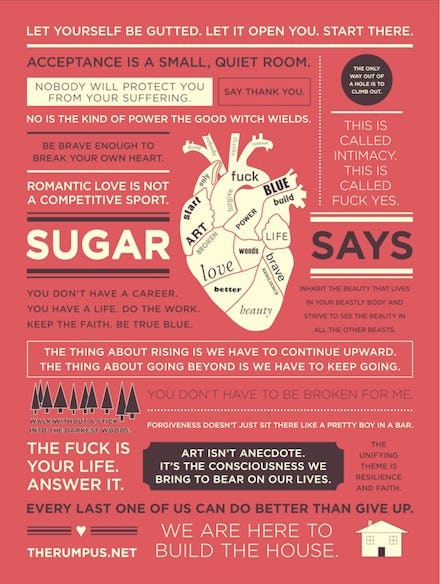This Column is the Only Advice 20-Somethings Need

When a friend suggested I read an advice column by a writer named Dear Sugar last year, I was resistant to it in much the same way most millennials would be. After all, who needs any more advice?
It seems as if everyone is trying to give millennials advice, especially in the easily digestible list form. From this abundance of advice — much of it highly critical — we've become suspicious, typically looking for ways to claim our particular situations don't align with a general case. We even tend to err on the side of irony, keeping a safe distance from engaging with our truest emotions. It's hard to catch our attention when links to any number of things we can do to embrace our 20s flood our Facebook feeds, or when we're constantly barraged with scathing critiques of our lifestyle.
Courtesy TIME.
But I do read what Dear Sugar has to say.
Though the overwhelming publicity surrounding the release of her memoir, Wild: From Lost to Found on the Pacific Crest Trail, has subsided, Cheryl Strayed will soon be in the spotlight again, with the release of the movie adaption of Wild in 2014. She is known as a gut-punching storyteller who is willing to ask readers to confront the indisputable facts — good or bad — of their own lives. Strayed is also the author of Dear Sugar, an advice column she originally penned as responses to letters sent to The Rumpus.
Finally, someone gave us the advice that we wanted, and needed, to hear — that we didn't need to be told what to do, we only needed to take the time to find it.
One of Strayed's most popular responses, "Tiny Beautiful Things," amassed 75,000 views its first week in 2011, and the collection of her essayistic responses of the same title debuted in 2012 at number five on the New York Times bestseller list. By writing as Sugar, Strayed built a fan base of readers who took her advice to heart and shared it. Finally, someone gave us the advice that we wanted, and needed, to hear — that we didn't need to be told what to do, we only needed to take the time to find it.
Courtesy The Rumpus.
These aren't pithy, generalized advice columns. Strayed creates something entirely different. To answer the letters she receives — some long and heartbreaking, others short and urgent — she often begins by taking the focus off "advice" from the start. To read one of Strayed's responses is to feel as if you came to her looking for a concrete answer and instead she poured you a cup of coffee, told you beautiful and relatable stories about her life, and suggested you just go wander in a bookstore for the day. She creates space in which we can solve our problems without trying to; we can let life solve itself. She creates a space where we can feel, for once, like maybe we don't need all that advice. We can live as she's lived.
'Your life will be a great and continuous unfolding.'
"Tiny Beautiful Things," her most famous essay, is written in response to the question "what would you tell your 20-something self if you could talk to her now?" Almost all her responses seem written in answer to this question — she never talks down to her readers or mandates behaviors; she speaks to herself and her life for us. She guides our own lives with a compassionate hand and the perspective of her own.
In "Tiny Beautiful Things," she writes about how her mother bought her a coat for Christmas just months before she died, framing it as advice: "Don't look at [your mother] skeptically after she tells you she thought the coat was perfect for you. Don't hold it up and say it's longer than you like your coats to be and too puffy and possibly even too warm."
Courtesy The Rumpus.
"You will regret the small thing you didn't say for the rest of your life. Say thank you," she writes. Suddenly, her stories become our own — and her reflections yield a sweeping suggestion. "There are some things you can't understand yet. Your life will be a great and continuous unfolding. It's good you've worked hard to resolve childhood issues while in your twenties, but understand that what you resolve will need to be resolved again. And again. You will come to know things that can only be known with the wisdom of age and the grace of years."
When we're in our 20s, we all want to think we're unique — and, to an extent, we are. But our problems are not necessarily our own. We've all lost and loved and had to be brave.
When we're in our 20s, we all want to think we're unique — and, to an extent, we are. But our problems are not necessarily our own. We've all lost and loved and had to be brave. We've all missed opportunities and failed miserably and had moments in which we were truly happy. In these moments, I let Strayed's wisdom echo in the background of my life. She hasn't told me I was doing something wrong and need to fix it; she has come alongside me and asked me, as gently as possible, only to listen. And I'm willing to.